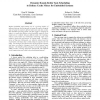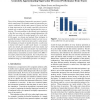36 search results - page 1 / 8 » Miss reduction in embedded processors through dynamic, power... |
DAC
2008
ACM
14 years 5 months ago
2008
ACM
Today, embedded processors are expected to be able to run complex, algorithm-heavy applications that were originally designed and coded for general-purpose processors. As a result...
ISCA
2006
IEEE
13 years 10 months ago
2006
IEEE
Level one cache normally resides on a processor’s critical path, which determines the clock frequency. Directmapped caches exhibit fast access time but poor hit rates compared w...
CF
2004
ACM
13 years 8 months ago
2004
ACM
Off-chip memory accesses are a major source of power consumption in embedded processors. In order to reduce the amount of traffic between the processor and the off-chip memory as ...
DATE
2008
IEEE
13 years 10 months ago
2008
IEEE
Modern embedded CPU systems rely on a growing number of software features, but this growth increases the memory footprint and increases the need for efficient instruction and data...
ISPASS
2009
IEEE
13 years 11 months ago
2009
IEEE
Trace-driven simulation of superscalar processors is particularly complicated. The dynamic nature of superscalar processors combined with the static nature of traces can lead to l...


